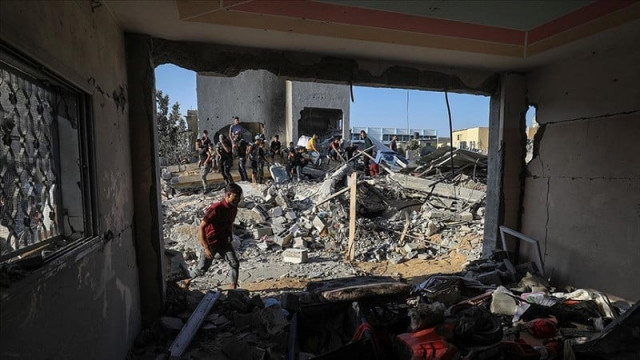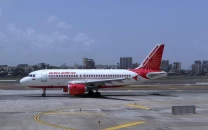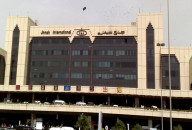No humanitarian supplies allowed into Gaza Strip for 1 week now: UN agency for Palestinian refugees
Over 2M people at risk across Gaza as water supplies run out, warns UNRWA

While no humanitarian supplies have been allowed into Gaza since Oct. 7, two million people across Gaza are in danger of running out of water, the UN agency for Palestinian refugees said on Saturday.
"It has become a matter of life and death. It is a must; fuel needs to be delivered now into Gaza to make water available for 2 million people," Philippe Lazzarini, the UNRWA commissioner-general, said in a statement.
"No humanitarian supplies have been allowed into Gaza for a week now," he said.
People are being forced to use dirty water from wells after Gaza's water plant and public water networks stopped working, he said, warning that the situation is exacerbating the risk of waterborne diseases.
He added that Gaza has also been under an electricity blackout since Wednesday, which also impacts the water supply.
Lazzarini stressed that drinking water is also running out in south Gaza, where thousands of people have sought refuge since Israel on Friday ordered over 1 million Gazans to leave their homes in the northern strip to go to the south.
Read also: More than 260,000 people displaced in Gaza as brutal Israeli reprisal continues
"Only in the past 12 hours, hundreds of thousands of people have been displaced," Lazzarini said. "The exodus continues as people move to the southern parts of the Gaza Strip. Nearly 1 million people have been displaced in one week alone."
He emphasized the need for sending fuel into Gaza, saying: "Fuel is the only way for people to have safe drinking water. If not, people will start dying of severe dehydration, among them young children, the elderly, and women."
Water is now “the last remaining lifeline,” he said. "I appeal for the siege on humanitarian assistance to be lifted now."
In a separate statement, the World Health Organization (WHO) said that water-borne diseases caused by a lack of clean water among blockaded people can lead to death.
"Lack of access to clean water is an immediate risk for water-borne disease outbreaks, which can be deadly among fragile populations with limited or no access to health care," Tedros Adhanom Ghebreyesus, the WHO director-genral, said on X.
Lack of access to clean water is an immediate risk for water-borne disease outbreaks, which can be deadly among fragile populations with limited or no access to health care. https://t.co/vjDmhUM08Z
— Tedros Adhanom Ghebreyesus (@DrTedros) October 14, 2023
Week of airstrikes
In a dramatic escalation of Middle East tensions, a week ago Israeli forces launched a sustained and forceful military campaign against the Gaza Strip, a response to a military offensive by the Palestinian group Hamas in Israeli territories.
The conflict began last Saturday when Hamas initiated Operation Al-Aqsa Flood against Israel, a multi-pronged surprise attack including a barrage of rocket launches and infiltrations into Israel via land, sea, and air.
Hamas said the operation was in retaliation for the storming of the Al-Aqsa Mosque in occupied East Jerusalem and Israeli settlers’ growing violence against Palestinians.
The Israeli military then launched Operation Swords of Iron against Hamas targets within the Gaza Strip.
Israel's response has extended into cutting water and electricity supplies to Gaza, further worsening the living conditions in an area that has endured a crippling siege since 2007, as well as ordering over 1 million Gazans in the northern strip to evacuate to the southern strip within 24 hours.



















COMMENTS
Comments are moderated and generally will be posted if they are on-topic and not abusive.
For more information, please see our Comments FAQ